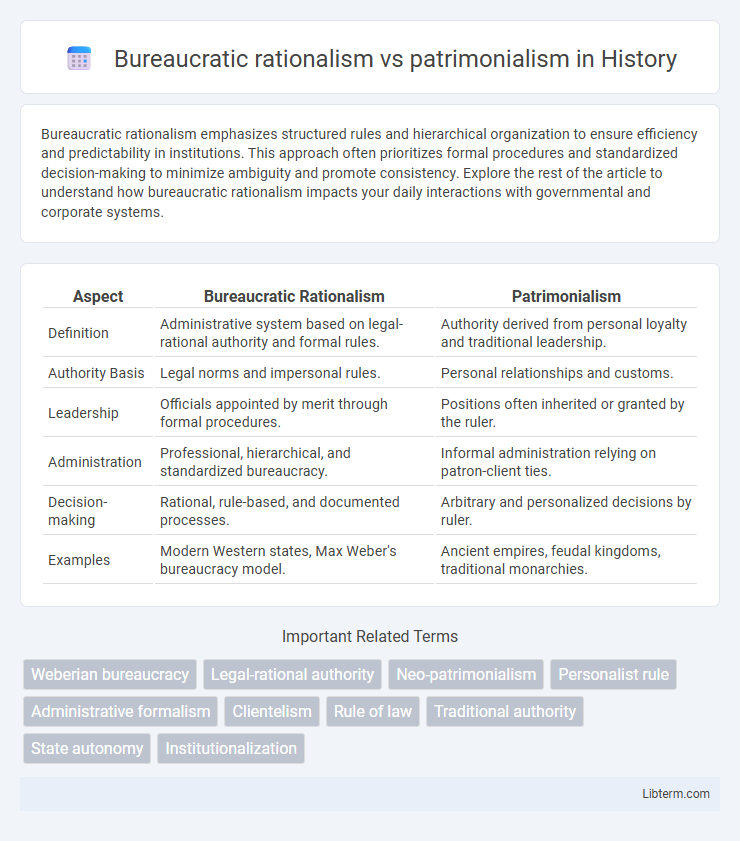Bureaucratic rationalism emphasizes structured rules and hierarchical organization to ensure efficiency and predictability in institutions. This approach often prioritizes formal procedures and standardized decision-making to minimize ambiguity and promote consistency. Explore the rest of the article to understand how bureaucratic rationalism impacts your daily interactions with governmental and corporate systems.
Table of Comparison
| Aspect | Bureaucratic Rationalism | Patrimonialism |
|---|---|---|
| Definition | Administrative system based on legal-rational authority and formal rules. | Authority derived from personal loyalty and traditional leadership. |
| Authority Basis | Legal norms and impersonal rules. | Personal relationships and customs. |
| Leadership | Officials appointed by merit through formal procedures. | Positions often inherited or granted by the ruler. |
| Administration | Professional, hierarchical, and standardized bureaucracy. | Informal administration relying on patron-client ties. |
| Decision-making | Rational, rule-based, and documented processes. | Arbitrary and personalized decisions by ruler. |
| Examples | Modern Western states, Max Weber's bureaucracy model. | Ancient empires, feudal kingdoms, traditional monarchies. |
Defining Bureaucratic Rationalism
Bureaucratic rationalism is defined by its systematic organization based on legal rules, formal procedures, and meritocratic principles designed to ensure efficiency and predictability in governance. It emphasizes specialization, hierarchical authority, and impersonal relationships within administrative institutions to achieve objective decision-making. This contrasts sharply with patrimonialism, where authority is personalized and power is exercised through traditional, often hereditary, loyalties and informal networks.
Understanding Patrimonialism
Patrimonialism is a form of governance characterized by the personalistic rule of a leader who treats state resources as private property, blending public authority with family or tribal loyalties. It relies heavily on informal patron-client networks rather than formal bureaucratic institutions, leading to governance structures where power is exercised through personal relationships and loyalty. Unlike bureaucratic rationalism, which emphasizes meritocracy, codified laws, and administrative procedures, patrimonialism blurs boundaries between the private and public spheres, resulting in governance driven by traditional authority and personal allegiance.
Historical Origins and Evolution
Bureaucratic rationalism originated during the rise of modern states in the 19th and early 20th centuries, emphasizing a rule-based, meritocratic administration driven by legal-rational authority as theorized by Max Weber. Patrimonialism traces back to pre-modern societies and traditional monarchies, where power flows through personal relationships and loyalty, reflecting the fusion of public authority with private ownership, often seen in feudal systems. Over time, bureaucratic rationalism evolved in tandem with industrialization and state centralization, while patrimonialism persisted in regions with weak institutional development and was often supplanted or transformed by modern bureaucratic structures.
Key Differences Between the Two Systems
Bureaucratic rationalism is characterized by rule-based governance, formalized procedures, and a meritocratic bureaucracy focused on efficiency and specialization. In contrast, patrimonialism relies on personal loyalty, traditional authority, and the fusion of public and private interests, with power centralized around a single ruler or ruling elite. Key differences include the basis of legitimacy--legal-rational authority in bureaucratic rationalism versus traditional or charismatic authority in patrimonialism--and the organizational structure, which is impersonal and hierarchical in bureaucratic systems but personalized and patrimonial in nature.
Impacts on Governance and State Structure
Bureaucratic rationalism fosters efficient, rule-based governance characterized by meritocratic administration and standardized legal frameworks, which promotes state centralization and institutional stability. Patrimonialism results in governance heavily reliant on personal loyalty and patron-client relationships, leading to fragmented authority and informal power structures that weaken institutional development and state capacity. The contrast influences state structure by shaping either rational-legal bureaucracies that support modern state functions or personalized, patrimonial regimes prone to nepotism and clientelism.
Bureaucratic Rationalism in Modern Institutions
Bureaucratic rationalism in modern institutions emphasizes formal rules, impersonal relationships, and merit-based authority to maximize efficiency and predictability in organizational operations. It contrasts with patrimonialism, which relies on personal loyalty, traditional authority, and discretionary power vested in leaders. Modern governments and corporations adopt bureaucratic rationalism to ensure accountability, standardized procedures, and effective governance across complex administrative structures.
Persistence of Patrimonial Practices
Patrimonialism persists in many modern states through informal networks and personalized authority, often undermining bureaucratic rationalism's principles of formal rules and impersonality. Despite efforts to establish merit-based administrations, patrimonial practices continue to influence appointments, resource distribution, and policy enforcement. This persistence is especially prevalent in states with weak legal institutions and limited accountability mechanisms, where traditional loyalties override bureaucratic norms.
Case Studies: Global Examples
Bureaucratic rationalism is exemplified by Germany's efficient Weberian administration, characterized by merit-based appointments and standardized procedures, contrasting with patrimonialism observed in Saudi Arabia where power is concentrated in a ruling family with personalized governance practices. In China, a hybrid model blends bureaucratic rationalism's formal institutions with patrimonial influences through party patronage networks, revealing complexities in governance transitions. Brazil's persistent patrimonial structures within its public sector demonstrate challenges in curbing nepotism and fostering bureaucratic impartiality despite formal legal frameworks.
Challenges of Transition and Reform
The transition from patrimonialism to bureaucratic rationalism faces challenges such as entrenched patronage networks, which hinder merit-based reforms and institutional transparency. Resistance from traditional elites complicates efforts to implement standardized procedures and legal-rational authority essential for effective governance. Overcoming these obstacles requires comprehensive strategies to depersonalize authority and strengthen administrative capacity through rule-bound, professional bureaucracies.
Implications for Future Governance
Bureaucratic rationalism emphasizes rule-based, impersonal administration and meritocratic appointments, fostering transparent and efficient governance structures that can adapt to complex societal needs. Patrimonialism relies on personal loyalty and patrimonial authority, often resulting in centralized power and limited institutional accountability, which may hinder democratic development and public service delivery. Future governance models prioritizing bureaucratic rationalism are likely to enhance institutional resilience and promote inclusive policy-making, while challenges remain in transitioning from patrimonial systems entrenched in traditional power dynamics.
Bureaucratic rationalism Infographic

 libterm.com
libterm.com